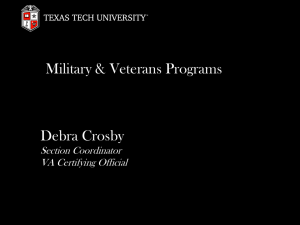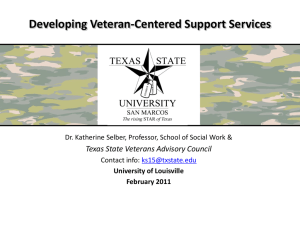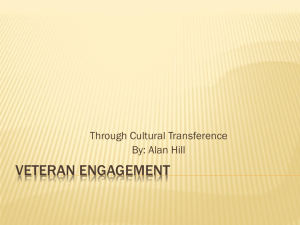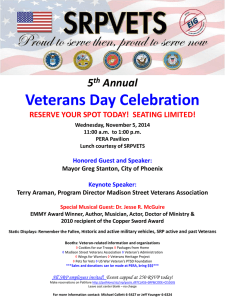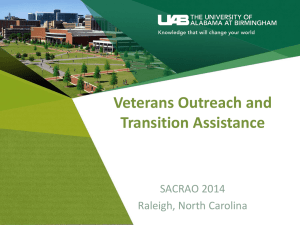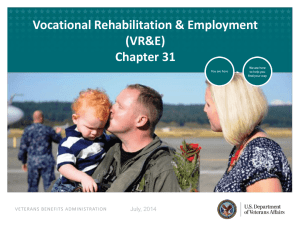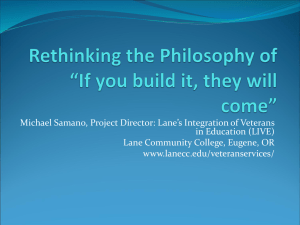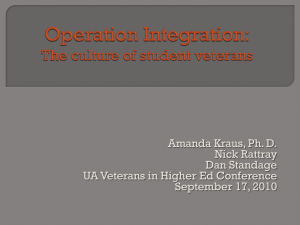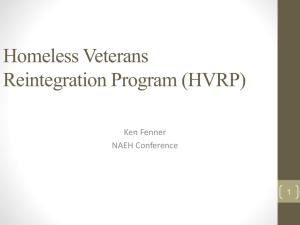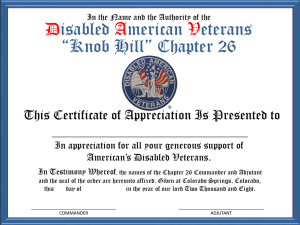- The Texas A&M University System
advertisement
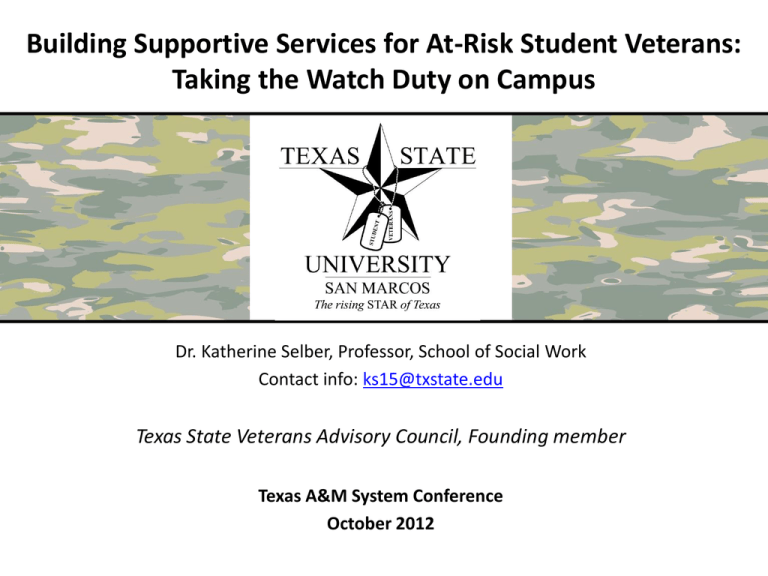
Building Supportive Services for At-Risk Student Veterans: Taking the Watch Duty on Campus Dr. Katherine Selber, Professor, School of Social Work Contact info: ks15@txstate.edu Texas State Veterans Advisory Council, Founding member Texas A&M System Conference October 2012 Framework for Veterans Initiative Supporting Through Transitions Holistic Framework for Understanding Individual Student Veteran (Adapted, DiRamio et al.2008) Texas State Student Veterans are At-Risk • • • • • Multiple deployments (71%) To combat zones (94% Iraq) (17% Afghanistan) Wounded, injured or physically hurt during military service (41%) Still having trouble with injuries (44%) Having health problem related to deployment other than wound or physical injury (38%) Dominque LaVista © Student Veterans Reported Unmet Health Needs • Overall medical needs (32%) • Psychological needs (23%) Sleep needs (40%) Needs concussive event (6%) Preventing Rule #2 How Do We Find & Follow At-Risk Student Vets ? 1. 2. 3. 4. 5. 6. 7. Active Outreach Letting Veterans Lead Peer- to- Peer Support Counseling Services Case Management- Linkage & referral Campus Training Array of non-traditional approaches Active Outreach Variety of events to reach different types of veterans on different parts of campus Vet resource fair, Socials, Tailgating, Community Partners as guest speakers, Combat Papermakers, River clean up, Pet Assisted Therapy, Golf Tournament Dominque LaVista © Dominque LaVista © Dominque LaVista © Letting Veterans Lead Gathering Their Input for Program Development: Focus Groups, Individual Interviews, Needs Assessments Veterans @ The Lead in all activities Dominque LaVista © Peer-to-Peer Support Veterans Alliance @ TxState It’s a Lifeline not just a student organization Hold regular events 2-3 per month Have a bench of leaders Educate them about signs and red flags Dominque LaVista © Counseling on Campus & Community • Individual & Group Counseling Services by Vets- our staff & Austin Vet Center staff Case Management Assessment, Referral, Linkage, Follow-up – Social Work Masters Interns Assigned to Veterans Initiative – Faculty Supervised – Called Veterans Interns – Outreach to vets • • • • • From Veterans Affairs Office Calls for those on Alert List due to low GPA Self referrals Referrals from faculty, staff- disability services Voluntary – Focus on first year vets Campus Training & Awareness Campus-Wide Training for Faculty & Staff : Helping Workshop format 1 ½ to 3 hours Twice a semester & by special request Tied into Veteran Friendly Office Program Award Plaque Student Training • Social Work Elective Course/Next Step Certificate – Train social work and others to work with troops/vets – Student Vet Interviews & Team Projects Dominque LaVista © Developing Peer Model: Navigating the Campus Zone (CampusNav)© Perform Outreach Perform Training Use Veterans Alliance- Adapt materials from & Friends & Family of peer-to- peer models Military (FFM) groups used in other settings Develop Self Care Link to Referrals Promote use of Refer to Counseling biofeedback equipment Center services provided by staff who are vets Outreach to increase Train veterans in Develop buddy system Pilot new mobile sleep enrollment of diverse resiliency skills to deal for campus exercise assessment tools for veterans with stress & help each programs addressing sleep issues other Launch campus-wide Faculty mentoring meditation skills group Bring services to outreach campaign program campus Send letters to vets Evaluate vets in peer Pet Assisted techniques Link to on-campus group training services Implement many types Follow up with vets Evaluate self care Link to outside of activities trained skills of vets services VA/Vet Center/ Grace Credits • Thanks to my son for his photos from his combat deployments and for his service and sacrifice. • Thanks to all the troops and student veterans for what they teach me every day. It is an honor to serve them. Capt. Will Selber Afghanistan Aug.2012
